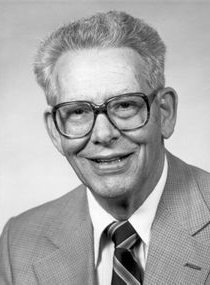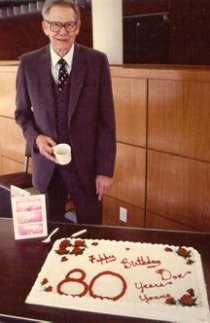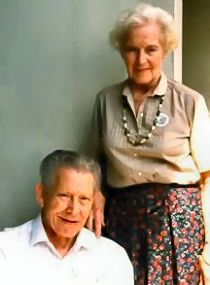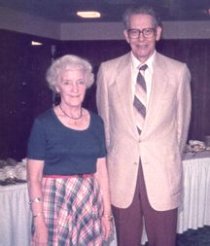|
|
||
| Don Kirkham | Don's Graduate Students | Don's Publications |
Don Kirkham, former Charles F. Curtiss Distinguished Professor of Agriculture and Professor of Physics at Iowa State University, was probably the best-known soil physicist of the 20th Century. His special interest was the flow of water through soils and drainage of agricultural land. Given that much of Iowa's farmland would not support a crop without drainage, this special interest was highly appropriate at Iowa State. Kirkham was born and raised in Utah. After two years as a missionary in Germany for the Church of Jesus Christ of Latter-day Saints, he studied physics at Columbia University, where he earned bachelor's, master's and Ph.D. degrees. Returning in 1937 to teach mathematics and physics at Utah State University, he became aware of agricultural and soil sciences by way of the newly emerging discipline of soil physics. These new vistas came about under the inspirational tutelage of Prof. Willard Gardner, soil physicist in the Utah Agricultural Experiment Station. In Kirkham's own words: "Although my teaching load was 18 hours a week, I was so much fascinated by the Utah State soil physics research program that I entered into it." In fact, he published 11 papers relating to drainage of agricultural soils between 1939 amd 1946. It was also at Utah State that Kirkham met his future wife, Betty. She also had studied at Columbia University, but the two never met there. They married on September 2, 1939, and raised three children: Victoria Eulalia, Mary Beth, and Don Collier. Returning from war service with the U.S. Naval Ordnance Laboratory in 1946, Kirkham was appointed as associate professor of soils and of physics at Iowa State University, with responsibilities for research and teaching in soil physics. This gave him the opportunity to devote much of his time and inexhaustible energy to agricultural drainage problems, thus enabled the flowering of his own special genius - his unparalleled insight and skill in solving the mathematical boundary value problems of soil-water movement, particularly as related to saturated flow and drainage. The host of exact mathematical solutions he provided has established him as without peer in this specialty, and qualifies him to be known as the founder of mathematical soil physics. He is credited with laying a mathematical foundation for drainage theory, changing the design of drainage systems from a purely experience-based skill to one based on physical understanding. Recognized as a highly effective teacher even by students outside soil physics, Kirkham's principal educational achievement is the 89 graduate degrees students earned under his guidance. He also was a prolific writer, co-authoring with his former student, Bill Powers, the highly regarded textbook, Advanced Soil Physics. He was first author on more than 70 scientific publications and co-author on many more. He accepted a number of overseas assignments, including to The Netherlands, Belgium, Turkey, Egypt and Argentina. He also received many honors, among them an honorary degree from the University of Ghent in Belgium, as well as the coveted Wolf Prize. He formally retired in 1978, but continued to work and publish until his death in 1998. In the last century, Don Kirkham probably had more impact on drainage theory and soil physics as a discipline than any other person in the world. His towering contribution came not solely from his considerable intelligence and intellectual skills but also from his kindly and unpretentious demeanor and spirit in dealing with students, colleagues and others. |
||
|
|
||
| Mary
Elizabeth (Betty) Erwin Kirkham Mary Elizabeth Erwin was born in Marion, Iowa, the daughter of George Leslie Erwin, a grocer, and Stella Franz Erwin, one of the first telephone operators in Iowa before her marriage in 1907. Betty was a valedictorian graduate of Marion High School in Marion, Iowa. In June, 1935, she received a bachelor's degree summa cum laude from Coe College in Cedar Rapids, Iowa, with a major in English. She graduated first in her class of 121 graduating seniors. As an undergraduate, she was elected into the National Honor Society of Phi Kappa Phi. After graduating from college, she worked one year as an insurance underwriter for Mutual Fire and Tornado Association in Cedar Rapids, Iowa. She then won a Lydia C. Roberts fellowship for graduate work at Columbia University in New York City. In June, 1937, she obtained her master's degree in the Department of English at Columbia University. In 1937-1938, she pursued her Ph.D. at Columbia University with the Lydia C. Roberts fellowship, but vacated the fellowship in September, 1938, to accept a higher paying job as an instructor in the English Department at Utah State College. She needed the money during the Depression to support herself and her parents. In Logan, Utah, she met Don Kirkham, and they married on September 2, 1939, after she had taught for one year at Utah State. Following their marriage, she purposefully gave up her career to support Don in his. She helped him with his experiments and edited and typed his manuscripts. She often edited the theses of Don's graduate students. In the early years, she would type the theses, volunteering her time, and, on one occasion, she stayed up all night to meet a grad school deadline. She and Don opened their home to Don's students for dinner parties and, often hosted international students on holidays. Don and Betty had three children: Victoria Eulalia, Professor of Romance Languages at the University of Pennsylvania, Philadelphia; Mary Beth, Professor, Department of Agronomy, Kansas State University, Manhattan; and Don Collier, Senior Partner in the law firm of Cravath, Swaine & Moore, New York City. Collier and his wife, Ann Smith Kirkham, a native of Fairfield, Iowa, have four children: John Collier, a senior at Harvard College, Cambridge, Mass.; Elizabeth Ann, a freshman at Middlebury College, Middlebury, Vt.; Robert Paul, an eighth grader; and Amy Lorraine, a fifth grader. In 1960, Betty returned to college teaching and was an assistant professor in the English Department at Iowa State University, until December, 1979, when she took early retirement to travel with Don to his professional meetings. She was named Outstanding Teacher of English at Iowa State University in 1976. Betty was active in Camp Fire Girls and was leader of a local group, 1951-1956. In 1955, she received the National Camp Fire Award for Group Leadership from the National Camp Fire Girls Council. In addition to Phi Kappa Phi, she was a member of Zeta Phi Eta (National Speech Arts Honorary), International Council of Teachers of English, the Modern Language Association, Alpha Gamma Delta, Daughter's of the American Revolution, Iowa State University Faculty Women's Club, Crescent Senior Women's Honor Society, and the First United Methodist Church. Betty frequently was asked to speak and gave professional book reviews and talks about her travels with Don. She contributed articles about her extensive travels to magazines and newspapers and had some of her poetry published. Betty loved music and was an accomplished pianist. She died May 9, 1996, of Wegener's granulomatosis, an uncommon auto-immune disease. |
||
|
|
||




